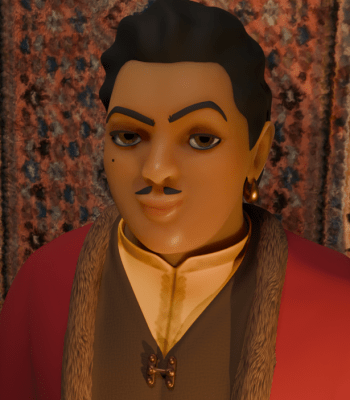Hopefully I'll have time in the future to elaborate on some more Avaria-specific and special Avaria-flavored (nom) versions of mythological creatures, but for now I'll try to quickly address just these questions.
How does folklore in Avaria compare to the real world?
Folklore in Avaria is very much like in the real world, except for our purposes (to nobody's surprise) the folklore that our characters right now would be familiar with is mostly that of the Middle East and Africa. So:
Dragons, vampires, werewolves?
Dragons: Sort of, but not really. Dragons are believed to reside in the huge mountain ranges that separate Ruvera and Near Ruleska from Altaruleska and Riendu, but they aren't common to folklore in the Sirdabi Caliphate. There is the Dragonsblood Marsh in Rahoum, but this refers to the ancient river "dragon" Ennescu, after which that river is named. Ennescu's much smaller progeny are said to still reside in the upper reaches of the rivers feeding into the Ennescu, and to be responsible for their periodic devastating floods.
Vampires: There are plenty of flesh-eating, child-devouring, blood-lapping demons inhabiting the folklore of the Caliphate, but nothing really akin to the eastern European vampire. There are ghuls (ghouls), which eat human flesh, but these are considered to be one of the more horrific tribes of jinn.
Werewolves: Not werewolves per se (most of the caliphate doesn't even have wolves), but there are were-beings of other kinds, particularly hyenas, leopards, and jackals. The jury is out on whether these are actual races of were-creatures, variously cursed individuals, or purposefully shapeshifting sorcerors bent on doing dark deeds.
Dragons, vampires, and werewolves would be much more common folklore in Ruvera, however, and werewolf folklore is particularly prevalent in western Ruvera.
Should we refrain from discussing any mythological being that doesn't have a wiki article, or can we assume that there is always going to be some kind of parallel to anything we can imagine?
I think it's fine for characters to believe in or tell stories about any real-life mythological being that belongs to the proper regional folklore -- again, largely Persian, Arabic, and various North/Central African cultures. Indian and southeastern Asian folklore would also be fine for Jalanjhur and southern Riendu, and the islands in between. Many of these creatures would probably also exist in Avarian folklore, and some of them could well be real!
That said, just because these creatures are real doesn't mean it's common for someone to encounter one. It's not considered overly credulous to believe in them, but actually stumbling across one is another matter. Mountain lions are certainly real, but despite spending a great many months of my life trekking around in mountain lion country I've never seen more than the signs of them. And despite widespread acceptance of the fact of mountain lion existence, people might also question me if I said I'd seen a mountain lion here in my own neighborhood. It would probably be much the same for characters talking about fantastical creatures in Avaria, since even those that are real would be far from common. On the flip side, just because a lot of people question the idea of encountering them in daily life, that doesn't mean these creatures aren't in fact out there!





